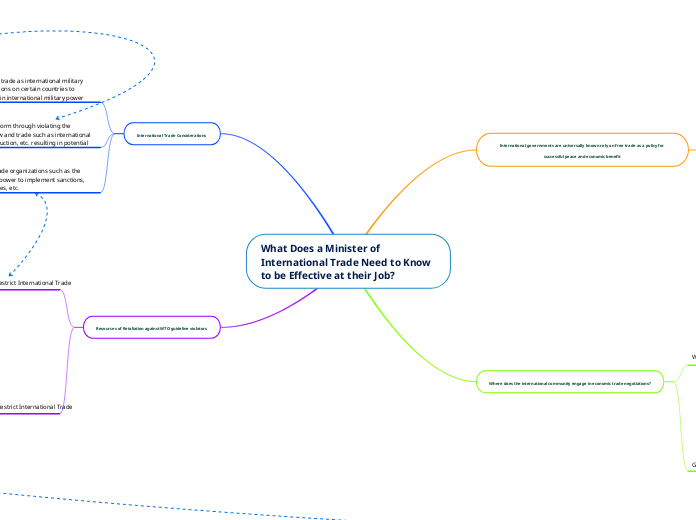by Paarth Sharma 3 years ago
245
What Does a Minister of International Trade Need to Know to be Effective at their Job?

by Paarth Sharma 3 years ago
245

More like this
Known for promoting trade and economic activism in third world and developing countries that require trade development for the economic well being of the nation.
For example, restrictions relating to trade in nuclear materials, narcotic drugs, weapons, and several measures to protect the environment have been implemented by a majority of WTO members. Although not all members have as the WTO does not possess any real authority over these countries' actions.
Tariffs increase the price of goods and services purchased from another country, making them less attractive to domestic consumers.
Used as a tool of protection, sanctions are coercive measures applied against a state or individuals that poses a potential threat to international peace and security
Can potentially increase domestic good prices as export subsidies are a government policy to encourage export of goods and discourage sale of goods on the domestic market
Export taxes are implemented and increased with dependance on scarcity and high demand of products which would increase or decrease the export tax percentage
A limited amount of a specific product which under official controls can be produced, exported, or imported.
Transparent, predictable and attractive investment
Decreases cost of life for civilians of member countries, leaving them with an increased share of disposable income
Awakens monetary progress and influences global governance
Their failure to uphold the principle of democracy. The policies of the WTO impact all aspects of society and the planet, although it lacks democracy and transparency
Unfair to developing third world countries as the WTO's function is designed to benefit international superpower members
Insecurity due to the fact that the WTO is not accountable for ensuring the nations’ security in any other aspect
Free Trade influenced concepts of growth and stability to overall society. Whereas, autarky induced the opposite, economic struggle and hardship
This act raised US tariffs on over 20,000 imported goods. An act designed to provide revenue, regulate commerce with foreign countries, to encourage American industries to protect American labor, and raised tariffs on the international community
As a result of absolute and comparative advantage, many international firms possess the power to sell at a lower price than domestic firms which attracts the vast majority of consumers
Trading to the right country or with the right country can bring greater economic benefit as every country possesses a different share of specific goods and resources
As a result of comparative advantage it allows consumers to acquire goods at the lowest price possible price, providing them with an economic benefit
However, Economists and free traders tend to oppose protectionism and discrimination